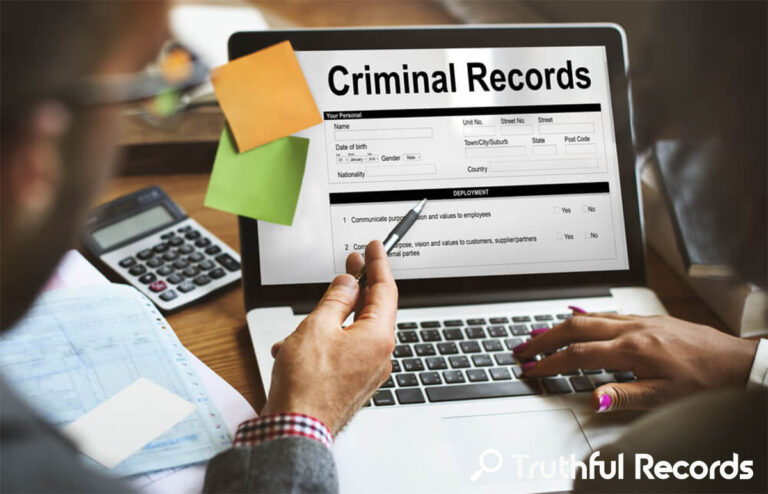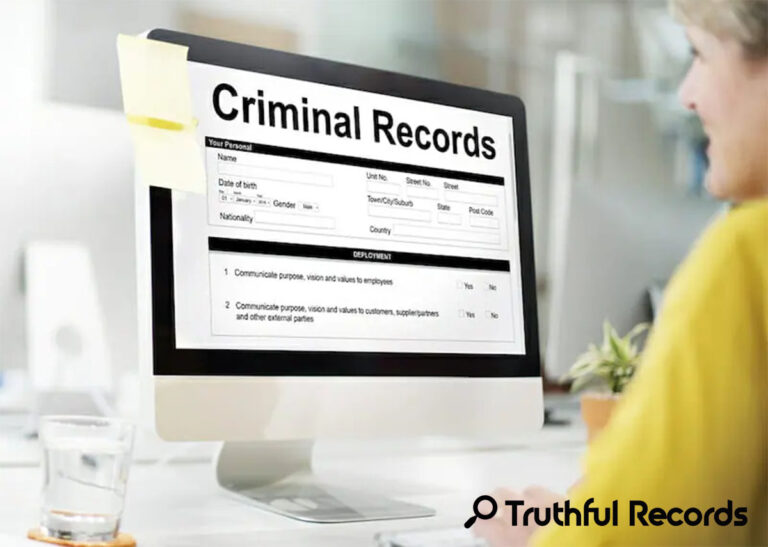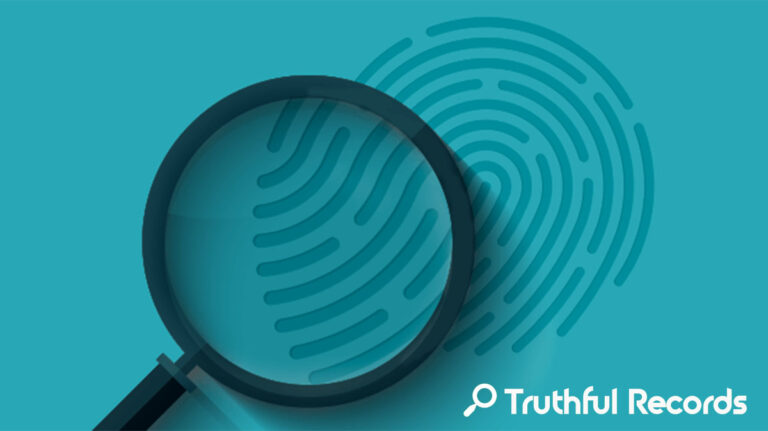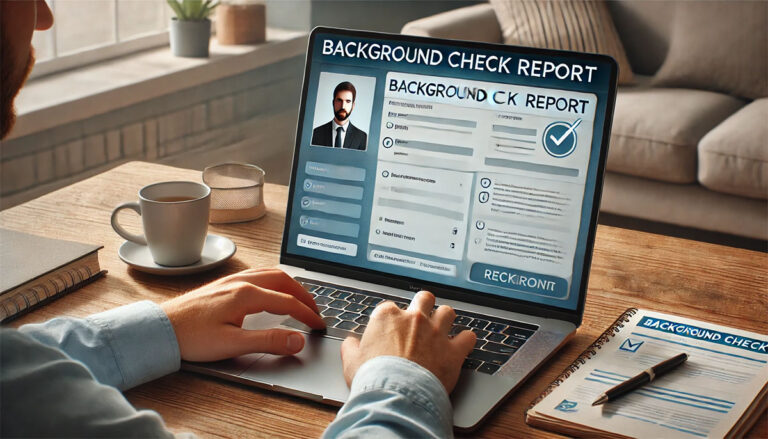Personal Background Check Guide: How to Research Anyone Safely and Legally (2025)
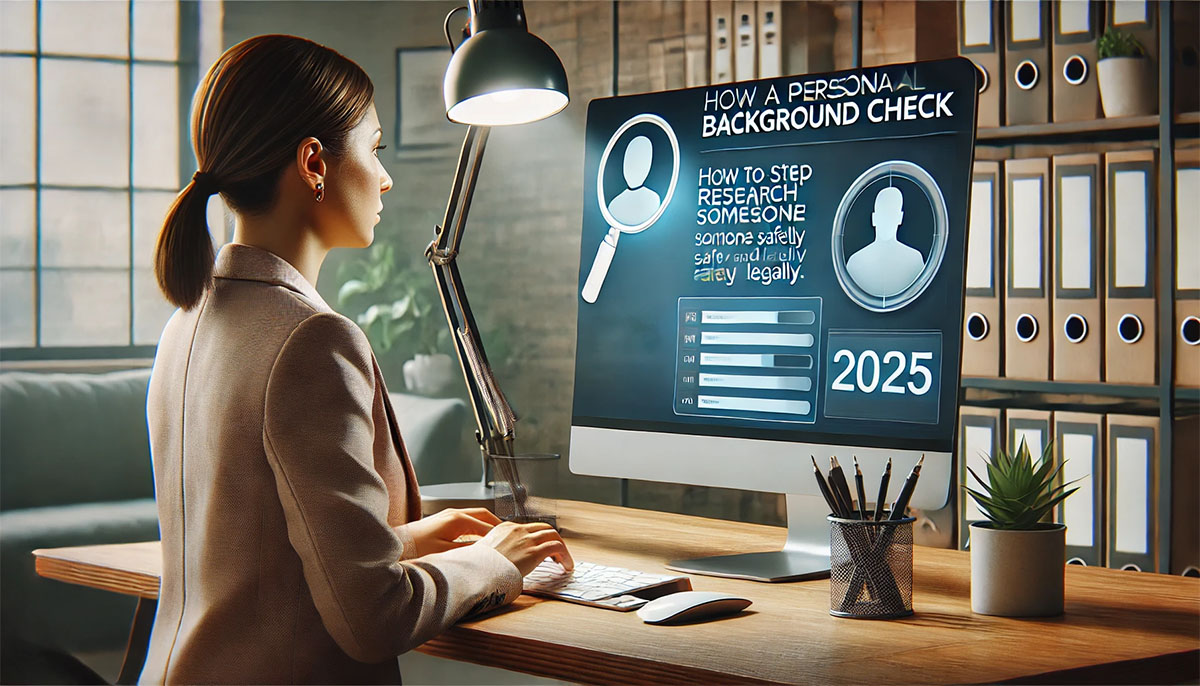
Every day, thousands of people search others online without knowing the right way to do it. From online dating to new neighbors, personal safety matters! Recent statistics show that 47% of online daters run background checks on potential matches – but 82% do it incorrectly.
Understanding Personal Background Checks
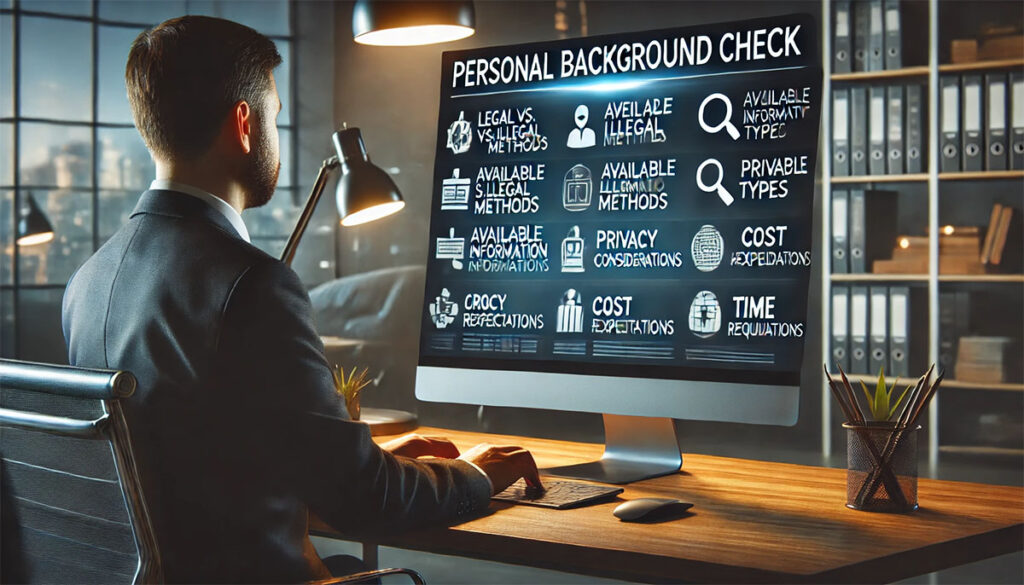
Ever Googled someone out of curiosity? You’re not alone. Whether you’re looking up a new neighbor, researching a potential date, or verifying a job candidate, background checks are more common than you think. But here’s the thing—not all searches are created equal. Some are totally legal, while others? Not so much. Plus, knowing what kind of information you can actually access, how much it costs, and how long it takes can save you from a whole lot of frustration. Let’s break it all down!
Legal vs. Illegal Methods
First things first—just because you can search for someone online doesn’t mean it’s always legal to use that information. Background checks fall into two main categories: legal and illegal methods.
Legal methods include using publicly available records, FCRA-compliant background check services, and searches where the individual gives their consent (like for employment screening). Services like TruthFinder and BeenVerified pull data from legal sources, meaning you won’t be crossing any ethical or legal lines.
On the flip side, illegal methods include hacking, using stolen credentials, or obtaining sensitive data without permission. For example, looking up someone’s credit report without their consent? That’s a big no-no under the Fair Credit Reporting Act (FCRA). And trying to access sealed court records? You could face legal consequences. Always make sure the service you’re using is operating within legal boundaries.
Available Information Types
So, what exactly can you find in a personal background check? Well, that depends on the service you use and the depth of the search. Here are some of the most common types of information you can legally access:
- Criminal records – Past arrests, convictions, and even traffic violations in some cases.
- Contact details – Phone numbers, email addresses, and mailing addresses (though accuracy varies).
- Social media profiles – Public Facebook, Twitter, Instagram, and LinkedIn accounts.
- Property records – Who owns what, mortgage history, and even past sales prices.
- Marriage and divorce records – Some states make these public, while others restrict access.
- Employment history – Limited but can sometimes show past job positions.
One thing to keep in mind: Not all background check services pull the same information. If you need comprehensive reports, services like Intelius or Instant Checkmate tend to dig deeper.
Privacy Considerations
Ever wondered what your background check says about you? You’re not alone. One of the biggest concerns people have is privacy—and for good reason. If you’re researching others, you should also know how to protect yourself.
Many background check services allow opt-outs, meaning you can remove your information from their databases if you don’t want to be searchable. Sites like BeenVerified and TruthFinder have removal options, though you may need to submit a request.
Also, be cautious when entering personal information into a background check site. If a platform doesn’t have encryption or a clear privacy policy, your data might not be as secure as you think. Stick with well-reviewed services and always read the fine print!
Cost Expectations
Let’s talk money. How much does a personal background check actually cost? The answer: It depends on how deep you want to go.
Here’s a rough breakdown of what to expect:
- Free searches – Basic info like name, age, and general location (but usually not much else).
- Single reports – $10 to $30 per report for one-time searches.
- Monthly subscriptions – $25 to $50 per month for unlimited searches.
- FCRA-compliant reports – Often cost more because they meet legal standards for employment and tenant screening.
If you just need a quick lookup, free searches or one-time reports might do the trick. But if you’re running multiple checks (like for hiring or finding old friends), a subscription to BeenVerified or TruthFinder might be the better deal.
Time Requirements
How long does a background check take? Some results show up instantly, while others require a bit of patience.
- Instant reports – Contact info, social media accounts, and general records (usually within minutes).
- Criminal and court records – Can take a few hours to a few days, depending on the state.
- Employment verification – If you’re running an official employment check, this can take days or even weeks.
- FCRA-compliant checks – Expect a longer wait, as they require consent and formal review processes.
For personal searches, services like BeenVerified, Intelius, and Instant Checkmate deliver results fast—sometimes in under a minute! But if you’re doing a professional screening, you’ll need to allow extra time for processing.
Free Research Methods
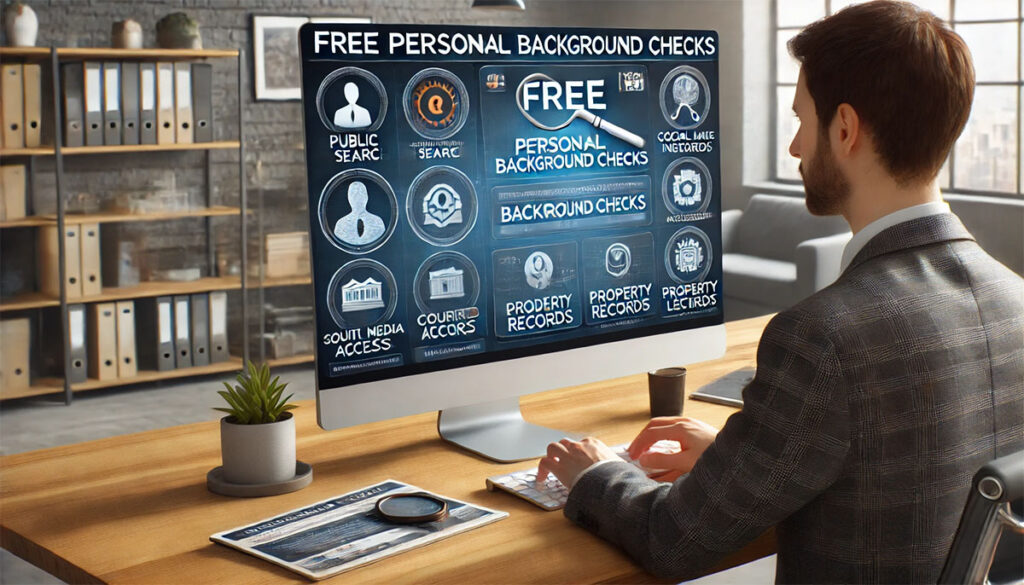
Not all personal background checks require a paid service. In fact, there are tons of free ways to find information if you know where to look! Whether you’re tracking down an old friend, verifying someone’s identity, or checking out a potential roommate, these free methods can uncover a surprising amount of details. Here’s how to do it—without spending a dime!
Public Records Search
Public records are a goldmine of information. Many government agencies make records available online, allowing you to search for details about someone’s past. These records can include:
- Birth and death records – Some states have online databases where you can verify basic personal details.
- Marriage and divorce records – Availability varies by state, but some counties post this information online.
- Business registrations – If someone owns a company, their business name and details may be searchable.
- Bankruptcies – Federal bankruptcy records are often public and can be found on the U.S. Courts website.
A great place to start is USA.gov or your local county clerk’s website. Keep in mind that while some records are free, others might require a small fee for copies or full reports.
Social Media Investigation
Social media is one of the fastest and easiest ways to dig up personal details on someone—for free! Many people overshare, making platforms like Facebook, Instagram, LinkedIn, and Twitter powerful tools for background checks.
Here’s what to look for:
- Profile details – Check names, locations, work history, and mutual friends.
- Photos and posts – See what kind of content they share and their public activity.
- Comments and likes – Get insights into their interests and personality.
- Connections – Who are they following? What groups do they belong to?
If a profile is private, try searching their username on Google—sometimes other platforms or older accounts will pop up. A tool like PeekYou can also help track down someone’s digital footprint.
Court Record Access
If you want to check for lawsuits, criminal history, or legal disputes, court records are a solid place to look. Many courts provide free online search tools, though some might require an in-person visit.
Where to check:
- Federal cases – Use the PACER system (note: some documents may have small fees).
- State courts – Many states have online case search tools where you can look up criminal records, civil disputes, and more.
- County court websites – Check local court portals for smaller cases, including evictions and restraining orders.
Keep in mind that not all records are available online—some require in-person visits or official requests. But if you’re lucky, you can find valuable info without ever leaving your computer!
Property Records
Want to see who owns a home or how much someone paid for their property? Property records are public information, and most counties have online databases where you can search by name or address.
What you can find:
- Ownership history – Who owns the property and when it was purchased.
- Property value – Estimated market value and past sale prices.
- Tax records – See if there are unpaid taxes or liens on the property.
- Mortgage details – Some counties show financing details, including lenders.
A quick Google search like “[county name] property records” will often lead you to the right website. For example, if you’re looking up a property in Los Angeles, you’d check the L.A. County Assessor’s website.
Professional Listings
If someone is a licensed professional, their credentials are often publicly available. This is especially useful for verifying doctors, lawyers, real estate agents, and other specialists.
Where to check:
- State licensing boards – Many professionals (like doctors, contractors, and attorneys) have license verification websites.
- LinkedIn – A great way to confirm work history and see if someone’s credentials match their claims.
- Company websites – Many professionals are listed on their employer’s site with contact details.
- Chamber of Commerce directories – If someone owns a business, they might be listed in local directories.
A quick way to verify a professional’s license is to visit their respective board’s website. For example, you can check a doctor’s license on the AMA website or an attorney’s credentials through the State Bar Association.
Paid Services Overview

While free research methods can uncover a lot, sometimes you need deeper, more reliable information. That’s where paid background check services come in! These platforms provide access to exclusive databases, verified records, and comprehensive reports that free searches just can’t match. Whether you’re verifying an identity, checking for a criminal history, or running a credit check, paid services can streamline the process. Let’s explore your options.
Background Check Platforms
If you need a fast and detailed background check, subscription-based platforms are your best bet. These services aggregate data from multiple sources, including criminal records, property listings, and social media profiles, to give you a full snapshot of a person’s history.
Best Background Check Platforms:
- TruthFinder – In-depth reports, dark web scans, and deep database access.
- BeenVerified – User-friendly and great for finding contact info, court records, and social media accounts.
- Instant Checkmate – Ideal for comprehensive criminal record searches.
- Intelius – Best for searching people’s phone numbers, emails, and property records.
Most of these platforms require a monthly subscription, usually ranging from $20–$50/month, with unlimited searches included.
Professional Investigators
Sometimes, an automated background check isn’t enough. If you need verified, court-admissible information, hiring a private investigator (PI) is a smarter choice.
Why hire a professional investigator?
- Legal compliance – PIs ensure that their findings hold up in court.
- Deep access – They can uncover sealed records, hidden assets, and confidential reports.
- Surveillance & Interviews – Unlike online services, investigators can do in-person interviews and stakeouts.
Cost? It varies. A basic report might cost $100–$500, while full surveillance or deep investigations can go into the thousands. Check out The National Association of Legal Investigators to find licensed professionals.
Identity Verification Services
Need to confirm someone’s identity? There are services that specialize in this, perfect for landlords, employers, and online transactions.
Best Identity Verification Services:
- ID.me – Used by government agencies and employers for verified ID checks.
- Onfido – AI-powered identity verification for businesses.
- Veriff – High-security identity checks with real-time verification.
These services compare official IDs, biometrics, and financial records to confirm someone is who they claim to be. Pricing varies, but business subscriptions often start at $30–$100 per check.
Criminal Record Databases
If your main concern is criminal history, there are specialized databases designed for law enforcement, employers, and security screenings.
Best Criminal Record Databases:
- GoodHire – FCRA-compliant criminal background checks for employers.
- Checkr – Great for businesses that need bulk criminal screenings.
- USSearch – Quick online searches for public criminal records.
These services scan national, state, and county databases for convictions, warrants, and sex offender registry listings. Expect to pay $30–$75 per report, depending on depth.
Credit Report Access
Need to check someone’s credit history? Unlike general background checks, credit reports require permission and are regulated by the Fair Credit Reporting Act (FCRA).
Where to Get Credit Reports:
- Experian – Direct access to personal and business credit reports.
- Equifax – Offers detailed credit history reports.
- TransUnion – Best for tenant screening and employment credit checks.
These services are mostly used by landlords, employers, and lenders, and reports typically cost $15–$40 per request.
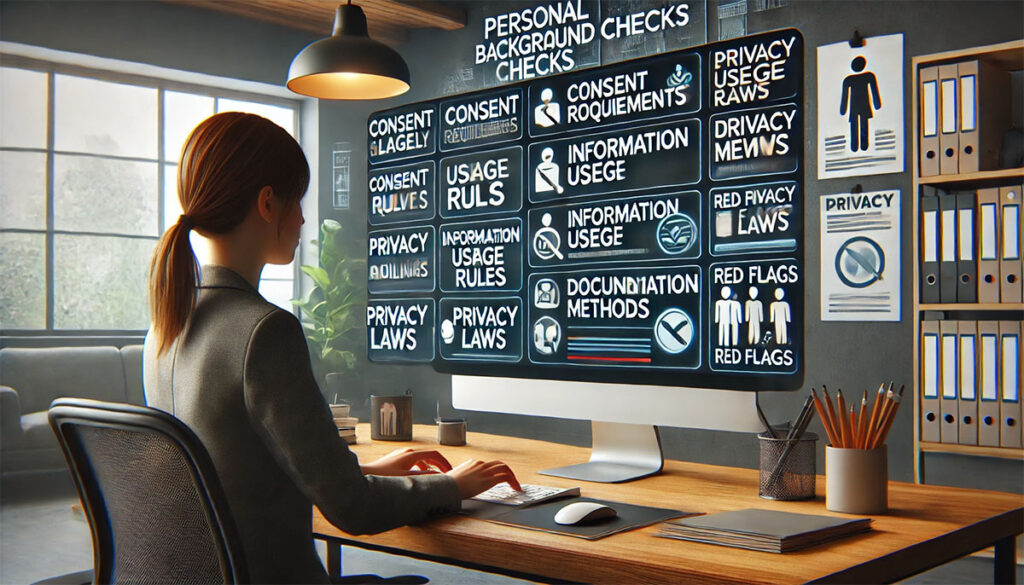
Safety and Legal Guidelines
When conducting a personal background check, staying within legal boundaries is crucial. Misusing someone’s data can lead to serious legal consequences, not to mention ethical concerns. Whether you’re screening a potential roommate, verifying an online date, or researching a new business partner, following safety and legal guidelines protects both you and the person being checked. Let’s go over the key points to keep your research safe, legal, and responsible.
Consent Requirements
One of the biggest legal mistakes people make when running a background check? Failing to get consent when required.
Here’s when you DO NOT need permission:
- Searching public records (court records, property ownership, business filings).
- Looking at social media profiles (as long as they are publicly available).
- Checking online directories for basic information.
Here’s when you MUST get consent:
- Employment background checks (FCRA requires written permission).
- Tenant screening (Fair Housing laws apply).
- Credit reports (illegal to access without consent).
If you’re running a check for official purposes, always ensure written consent is obtained. For more on compliance, visit the FTC website on background check regulations.
Information Usage Rules
Just because you find information legally doesn’t mean you can use it however you want. There are strict rules on how background check data can be applied.
✅ Legal Uses:
- Personal safety – Researching a potential roommate, online date, or neighbor.
- Verifying a business relationship – Checking if a contractor or employer is legitimate.
- Looking up personal records – Running a self-check to see what’s out there.
❌ Illegal or unethical uses:
- Stalking or harassment – Searching for someone’s address or private details for intimidation.
- Identity theft – Using someone’s personal data to impersonate them.
- Employment or housing discrimination – Making decisions based on race, age, or gender.
When in doubt, ask yourself: “Would I be okay if someone used this information about me?” If the answer is no, reconsider your actions.
Privacy Laws
Laws regarding personal data protection are getting stricter. Many background check platforms must comply with these regulations, and you should too.
Key laws to be aware of:
- Fair Credit Reporting Act (FCRA) – Governs background checks for employment, housing, and credit.
- General Data Protection Regulation (GDPR) – Protects personal data of EU residents.
- California Consumer Privacy Act (CCPA) – Gives California residents the right to remove their data from databases.
If you want your own data removed from background check sites, most services offer opt-out options. You can check out TruthFinder’s opt-out page or BeenVerified’s opt-out tool to remove your information.
Documentation Methods
If you’re running a legitimate background check—whether for business, safety, or legal purposes—keeping proper documentation is key.
How to document your findings responsibly:
- Take screenshots of important records (court cases, property records).
- Keep a digital record of your searches (date, time, source).
- Save written consent if performing an employment or tenant screening.
- Avoid storing sensitive data longer than necessary (especially Social Security numbers or financial details).
Keeping accurate records ensures compliance if you ever need to justify your background check.
Red Flags Recognition
Not all background check results are straightforward. Sometimes, you’ll come across red flags that require a deeper look.
🚩 Common Red Flags to Watch For:
- Inconsistent identity details – Different names, addresses, or birth dates appearing in records.
- Sealed or expunged records – If court documents reference “sealed” cases, don’t assume guilt.
- Multiple recent address changes – Could indicate instability or an attempt to hide history.
- Financial trouble – Bankruptcies and liens could be signs of financial risk in business dealings.
- Social media discrepancies – If a person’s LinkedIn says one thing but Facebook says another, dig deeper.
🔎 What to Do If You Find a Red Flag:
- Verify with official sources – Look up records directly from government databases.
- Cross-check multiple sources – One incorrect report doesn’t mean it’s true.
- Consider context – Not all negative information is a dealbreaker.
Interpreting Results
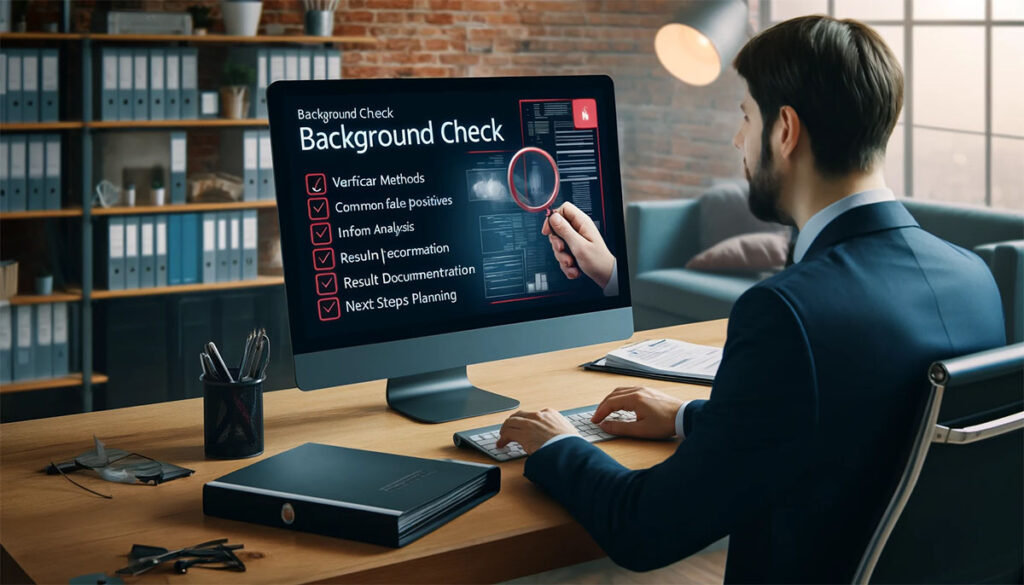
So, you’ve run a background check—now what? Interpreting the results is just as important as gathering the information. A mistake here could lead to false assumptions, unnecessary concerns, or even legal trouble if the data is misused. To ensure accuracy, let’s go over how to verify findings, recognize false positives, analyze data effectively, document results, and plan next steps.
Verification Methods
Not all background check results are 100% accurate. Databases pull information from multiple sources, and errors happen more often than you’d think! Before making any decisions, take time to verify the details.
How to confirm your findings:
✅ Cross-check with official sources – If you find a criminal record, check the county court database to confirm.
✅ Compare details – Make sure names, dates, and addresses match. A similar name does not mean it’s the same person!
✅ Look for supporting evidence – A single record doesn’t always tell the full story. Dig deeper.
For example, if you find a bankruptcy record, verify it on PACER (the federal court system). If an arrest shows up, check state and county websites to confirm whether it resulted in a conviction.
Common False Positives
Background check false positives are more common than people realize. Mistaken identities, outdated records, or incomplete data can make someone look like they have a criminal history—even when they don’t.
🚩 Common False Positives to Watch For:
- Same name, different person – If someone has a common name, there’s a chance their records are mixed up with another person’s.
- Expunged records still appearing – If a record was sealed or expunged, it shouldn’t show up, but some databases don’t update in real-time.
- Arrest without conviction – Someone may have been arrested, but that doesn’t mean they were guilty.
- Wrong addresses – Some reports combine multiple people’s data if they lived at the same address in the past.
If something seems off, always double-check before making any judgments.
Information Analysis
Interpreting background check data requires context. Just because a report shows something “negative” doesn’t automatically mean it’s a red flag.
Here’s how to analyze the information properly:
🔍 Criminal Records – Was it a minor offense or something serious? Was it recent or from 20 years ago?
🏡 Address History – Frequent moves aren’t always bad—it could just mean someone relocated for work.
📉 Financial History – A single bankruptcy from 10 years ago doesn’t mean someone is financially unstable today.
Also, check patterns. One outdated debt? Probably not a concern. Multiple debts across different years? That’s a red flag.
Result Documentation
If you’re running a background check for legitimate purposes (like hiring or personal safety), keeping records is essential. Proper documentation helps ensure compliance and protects you legally.
How to document your findings:
📌 Save key details – Keep screenshots or copies of reports.
📌 Date & time stamp searches – This helps prove accuracy if you need to reference results later.
📌 Highlight verified sources – Include links to official databases or court records.
However, be mindful of privacy laws! Never store Social Security numbers or sensitive personal data beyond what’s necessary.
Next Steps Planning
Now that you have the results, what’s next? Depending on your purpose, you’ll need a clear action plan.
🔹 Hiring Decision? – If you’re an employer, ensure FCRA compliance before rejecting a candidate.
🔹 Tenant Screening? – If concerns arise, verify details before denying an application.
🔹 Personal Research? – If something seems questionable, try to confirm details with the person directly.
If the results are concerning, your next steps could include:
- Running deeper verification through official sources.
- Consulting a legal expert if the findings involve serious records.
- Reaching out to the individual for clarification.
Conclusion
Conducting personal background checks requires careful attention to legal requirements and ethical considerations. Start with free resources, then use paid services when needed for more detailed information.

